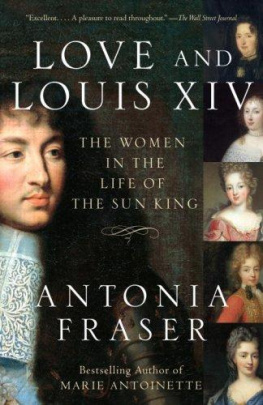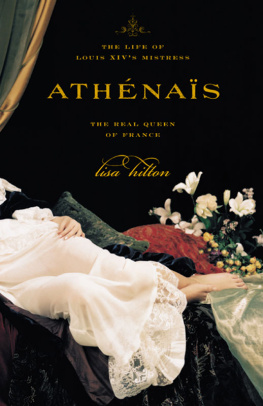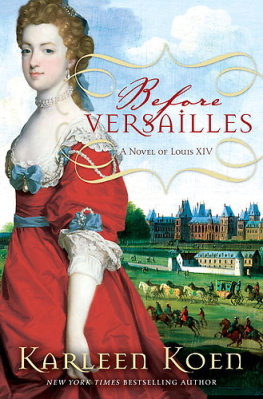Contents
Guide
Page List
LOUIS XIV
The Power and the Glory

Josephine Wilkinson

CONTENTS

I t is perhaps only fitting that the story of the most legendary king ever to sit on the throne of France should itself begin with a legend. It opens on a bleak December day in 1637 when a small company of riders thunders through the narrow streets of Paris. They have just left the small hunting lodge of Versailles and are now making their way towards Saint-Mand, on the eastern edge of the city. As they ride along the rue Saint-Antoine, one of them suddenly signals his desire to stop, and the small party comes to a halt outside the convent of the Visitation. The man dismounts and enters the building while the others wait patiently outside.
Within, all is peace and tranquillity, while the unassuming design and austere dcor contribute to the general atmosphere of no-nonsense solemnity. The man crosses the floor, making his way towards a wooden door whose only feature is a grille closed from the inside. No one approaches him or tries to impede his progress in any way, for he is a regular visitor to the convent and well known to the nuns. Besides, few would be so bold as to challenge the king of France, who has come to see a close friend, to discuss his problems, and receive her wise counsel.
Out of courtesy, a small stool is placed before the door; he sits and patiently awaits his friends arrival. Suddenly the grille slides open and the king looks upon the familiar, exquisite face of the novice. She smiles in greeting. She knows why Louis has come, and she listens with a serenity that belies her youth as he confides to her his secret worries about the state, his dealings with his ministers, and, most poignantly, his difficult relationship with his queen. She offers her advice as best she can, but most of the time she merely allows him to unburden himself. Then, at a carefully chosen point in their conversation, she takes the opportunity to urge him, as she has done so many times before, to reconcile with the queen, for France is very much in need of a dauphin.
After a time, Louis XIII takes leave of his friend and steps into the street to discover that the storm which had been threatening all afternoon has finally broken. Undaunted, he mounts his horse, and the small party resumes its journey amid the gathering darkness. They do not travel very far before the weather, already bad, has deteriorated markedly. The cold and drenching rains whiten into a heavy sleet, which in turn gives way to driving snow, while the blustering winds make it impossible to keep the torches lit. Guitaut, the trusted captain of the kings guard, suggests that it would be folly to go any farther, and that it might be better to spend the night at the Louvre. This makes sense. The Louvre is still only a short ride away; it is warm and dry, and the hunting party could resume its excursion in the morning. The king, however, is reluctant. He knows the queen is in residence at the Louvre, but they have been estranged for some time; besides, he is expected at Saint-Mand, and his bed and other necessities have been sent on ahead, while his hosts are awaiting his arrival, as are his servants. Louis looks at the sky and assures Guitaut that the storm will soon pass and they should continue on their way.
Before long, however, it becomes obvious that the storm is growing yet more violent. Guitaut speaks up again, reiterating his proposal that they go to the Louvre for the night. Again the king protests, pointing out that the queen takes her supper and retires too late for him. Guitaut assures his master that she would conform to the kings wishes in this respect, and Louis, reluctantly, indicates his consent.
As the small company retraces its steps and makes its way towards the Louvre, Guitaut rides ahead to alert the queen of the kings imminent arrival and state the time at which he would like to take his supper. The queen issues orders to serve the king his favorite dish, and the royal couple shares a warming meal. They then withdraw for the night, and Louis finds that his pillow has been placed on the queens bed. Nine months later, the queen, Anne of Austria, gives birth to their son, the dauphin of France. The child is named Louis, but at his formal baptism he will be given a second name, one that reflects the miraculous nature of his arrival: Dieudonn, for Louis XIV of France truly was a gift from God.
As with all legends, this one has some basis in fact, but not much. However, its author, the Abb Griffet, was correct to portray the coming of the dauphin as a prodigious event, for the fact was that Louis XIV was born at a time when France had every reason to give up hope that her king would ever produce a much-desired heirand the circumstances of Louis XIVs conception and birth are every bit as dramatic as the legend.
LOUIS XIV

I t was a charming scene. In the fairy-tale chteau at Burgundy, the bride and groom, both of whom were only fourteen years old, came together for the formal solemnization of their marriage. Anne of Austria was as beautiful as the day, They exchanged gifts, Louis presenting Anne with a plume from his hat, while she gracefully acquiesced to his request for one of the bows that bound her hair.
The wedding festivities would continue into the night, but first the royal couple was ceremonially put to bed as other members of the royal family and courtiers looked on and a priest blessed the marriage bed in the hope that God would help the couple produce an heir. Where the bride and groom were children, this symbolic consummation was all that was required, and the groom, having been placed in the bed beside his wife before witnesses, would then be removed and taken away to his own chamber. The young couple would then continue to live in separate households until it was decided that they were old enough to begin their married life together in the fullest sense. However, Louis and Anne, despite their youth, were deemed old enough to begin living together as husband and wife immediately, and it was here that the problems began.
At the time of his wedding to Anne of Austria, Louis XIII of France already had a highly developed aversion towards women. This was largely the result of the schemes and conspiracies of his mother, Marie de Mdicis, who proved reluctant to relinquish the power she had exercised as regent, and who had always favored her younger son, Gaston, duc dOrlans, at the expense of the king. Now, as he stood on the threshold of manhood, Louis appeared disinclined to consummate his marriage.
At five thirty in the afternoon, Louis announced that the wedding ceremonies had tired him out, and he retired to his room. No amount of persuasion would induce him to change his mind, and when his courtiers regaled him with lurid sex stories, they seemingly made a bad situation worse. However, the kings behavior was merely artifice, part of a larger ritual designed for such a momentous occasion.
When, after almost two hours, Louis had still not emerged from his chamber, Marie de Mdicis entered and, as his companions looked on, announced, My son, its not all done in getting married; you have to come to see the queen your wife, who awaits you. Louis replied, Madame, I was only waiting for your command. Im happy to set out with you to find her. The nervous bridegroom allowed himself to be led by his mother to Annes chambers, to find her sitting up in bed. My daughter, said Marie, here is your husband whom I bring to you; receive him into your bosom and love him well, I beseech you. Anne expressed her eagerness to please Their Majesties, before the young king and queen were left in the care of two royal nurses. The sumptuous curtains were drawn around the bed and, after a little over two hours, Louis called for his slippers and dressing gown. He withdrew to his own chamber, announcing that he had done his duty twice.



















